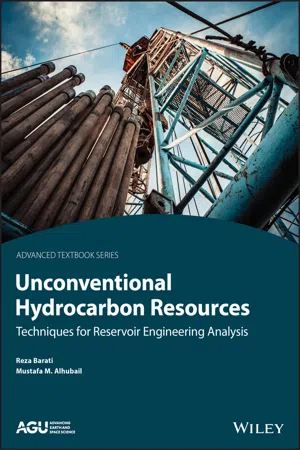
Unconventional Hydrocarbon Resources
Techniques for Reservoir Engineering Analysis
- English
- ePUB (mobile friendly)
- Available on iOS & Android
Unconventional Hydrocarbon Resources
Techniques for Reservoir Engineering Analysis
About this book
A comprehensive textbook presenting techniques for the analysis and characterization of shale plays
Significant reserves of hydrocarbons cannot be extracted using conventional methods. Improvements in techniques such as horizontal drilling and hydraulic fracturing have increased access to unconventional hydrocarbon resources, ushering in the "shale boom" and disrupting the energy sector.
Unconventional Hydrocarbon Resources: Techniques for Reservoir Engineering Analysis covers the geochemistry, petrophysics, geomechanics, and economics of unconventional shale oil plays. The text uses a step-by-step approach to demonstrate industry-standard workflows for calculating resource volume and optimizing the extraction process.
Volume highlights include:
- Methods for rock and fluid characterization of unconventional shale plays
- A workflow for analyzing wells with stimulated reservoir volume regions
- An unconventional approach to understanding of fluid flow through porous media
- A comprehensive summary of discoveries of massive shale resources worldwide
- Data from Eagle Ford, Woodford, Wolfcamp, and The Bakken shale plays
- Examples, homework assignments, projects, and access to supplementary online resources
- Hands-on teaching materials for use in petroleum engineering software applications
The American Geophysical Union promotes discovery in Earth and space science for the benefit of humanity. Its publications disseminate scientific knowledge and provide resources for researchers, students, and professionals.
Frequently asked questions
- Essential is ideal for learners and professionals who enjoy exploring a wide range of subjects. Access the Essential Library with 800,000+ trusted titles and best-sellers across business, personal growth, and the humanities. Includes unlimited reading time and Standard Read Aloud voice.
- Complete: Perfect for advanced learners and researchers needing full, unrestricted access. Unlock 1.4M+ books across hundreds of subjects, including academic and specialized titles. The Complete Plan also includes advanced features like Premium Read Aloud and Research Assistant.
Please note we cannot support devices running on iOS 13 and Android 7 or earlier. Learn more about using the app.
Information
1
Introduction to Unconventional Hydrocarbon Resources
1.1 Background
Table of contents
- Cover
- Table of Contents
- Title Page
- Copyright Page
- Contributors
- Preface
- 1 Introduction to Unconventional Hydrocarbon Resources
- 2 Petrophysical Properties of Unconventional Reservoirs
- 3 Petroleum Geochemistry in Organic‐Rich Shale Reservoirs
- 4 Application of Imaging Techniques in the Characterization of Organic‐Rich Shales
- 5 Geomechanical Properties of Unconventional Reservoirs
- 6 Hydraulic Fracturing
- 7 Phase Behavior of Shale Oil and Gas
- 8 Fluid Flow Through Nanosized Pores
- 9 Decline Curve and Rate Transient Analysis
- 10 Petroleum Economics of Unconventional Shale Reservoirs
- 11 Environmental Aspects of Shale Hydrocarbon Reservoir Developments
- Index
- End User License Agreement